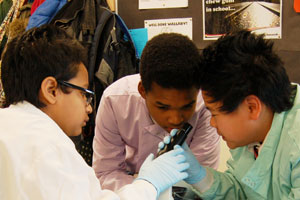Pupils discover new treatment to stop the spread of worm infection
23 Jul 2013
Pupils from Trinity Church of England High School in Hulme have been working with our scientists to carry out research into a condition which affects around one billion people worldwide.

The 29 youngsters conducted an eight-week experiment with scientists from the University’s Institute of Inflammation and Repair looking at the development of eggs from worms that infect your gut.
The pupils learnt how worm eggs infect children around the world, hatching inside the gut and causing malnutrition and sickness. Infections can make children so ill that they miss out on important education.
In their experiment, the pupils treated worm eggs with different substances to try and stop eggs developing into worms, to stop the spread of disease.
They found for the first time that clove oil, a natural product which grows in many areas where worm infections are common, stopped egg development by 50%. This means that clove oil has the potential to be a natural therapy and reduce the spread of worm infection. Pupils then created posters showcasing their results, and took part in a presentation day with parents, staff and students from the University, 24 large pizzas and 150 pieces of cake!
Dr Jo Pennock, from the Institute of Inflammation and Repair, said: “Most of the children and their parents had never been to the University before and didn’t know very much about what scientists did. We hope that by working more closely with local children, we’ll inspire and encourage them to take up science, both as a subject choice but also as a career.
“Actually by the end of the project a quarter of them had changed their mind about scientists in general, which is always a plus!’’
All pupils received a certificate for participation and prizes were awarded, presented by Professor Richard Grencis from the University’s Faculty of Life Sciences. The project was funded by a Royal Society Partnership grant between Dr Catherine Alnuamaani from Trinity Church of England High School, and Dr Pennock.
Ann Flatman, Deputy Headteacher at Trinity Church of England High School, said: “The Trinity Community are extremely proud of our pupils and the work they have carried out during the Royal Society Research Project. It is a joy to see pupils engaged and learning practical scientific skills. As a church school it is extremely important to us that our pupils gain a real understanding of the hardships faced by others within our global community. The fact that they have stumbled across a potential solution to a condition that affects millions of other children world wide is an added bonus, to say the least."
Parent Alison Steadman, from Hulme, said: “I've lived in Manchester all my life but I've never been inside the University. This has been a fantastic day.”
The University team now hopes to secure additional funding from the Gates Foundation to further this research and understand how clove oil could potentially treat these infections
